What if your fitness tracker could quietly alert you to a heart issue—before you even feel it? In 2025, that’s no longer a futuristic idea. Today’s top wearables do more than count steps—they can now help detect serious conditions like AFib (atrial fibrillation), which often shows no signs until it leads to something dangerous, like a stroke.
The right device could make all the difference. But with so many options out there, it’s fair to ask: Which fitness tracker can detect AFIB accurately and reliably? In this guide, we’ll highlight the best picks of 2025—wearables that go beyond hype and actually help you stay ahead of your heart health.
🔍 What Is AFib and Why Early Detection Matters
Your heart works quietly in the background—beating steadily while you live your life. But sometimes, something shifts. A flutter. A skip. Or nothing at all.
That’s the tricky thing about AFib. It doesn’t always announce itself, and that silence can be dangerous.
The good news? You don’t have to wait for a warning sign. Today’s smartwatches can quietly keep watch for you. With sensors like PPG and ECG—some even FDA-cleared—they’re more than step counters. They’re gentle protectors, ready to tap you on the wrist and say, “Something feels off. Let’s check.”
It’s not just tech. It’s peace of mind—disguised as a watch.
🏆 2025’s Top 5 Picks: Which Fitness Tracker Can Detect AFIB Accurately?
If you’re looking for a best fitness tracker that can actually detect AFib—not just make big promises—you’re in the right place. These 2025 picks combine real tech (like ECG and PPG sensors), reliable performance, and even FDA clearance in some cases. Whether you want clinical-level data or quiet peace of mind, these wearables have your heart covered.
1. Apple Watch Series 9 | Best for iPhone Users | FDA-Cleared ECG & AFib History

🩺 Why It Stands Out for AFib Monitoring
Let’s be real—there are a lot of smartwatches out there that promise to “look after your heart.” But if you’re serious about tracking something as important (and sneaky) as AFib, the Apple Watch Series 9 is in a league of its own—especially if you already use an iPhone.
This watch doesn’t just tell you to stand up every hour or count your steps. It quietly keeps tabs on your heart rhythm in the background and steps in when something’s not quite right. It’s like having a calm, reliable friend who knows when to speak up—and when to just let you go about your day.
⚡ Built-In ECG and Always-On Rhythm Alerts
Here’s the thing that makes this watch so powerful: it’s got an ECG right inside. No wires, no appointments. Just rest your finger on the Digital Crown, wait 30 seconds, and it gives you a snapshot of your heart’s electrical activity. And yes—it can spot signs of atrial fibrillation with surprising accuracy.
Even better, it doesn’t rely on you to remember to check. It runs passive rhythm monitoring while you’re watching Netflix, sleeping, or walking the dog. If your heart starts acting up in the background, it gives you a quiet nudge. No drama, just a heads-up.
📊 So… How Accurate Is It?
Pretty darn accurate. Studies have shown that Apple’s ECG feature holds up well when compared to what you’d get at a clinic. The FDA has cleared it for AFib detection, which means this isn’t just a cool feature—it’s a trusted medical tool when used correctly. Of course, it’s not meant to replace your doctor, but it sure helps you know when it’s time to call them.
📅 AFib History: Your Heart’s Gentle Journal
Your heart doesn’t talk—but your watch quietly listens. AFib History acts like a soft-spoken journal, tracking those unnoticed skips and flutters as you go about your day. Over time, it reveals patterns—maybe your rhythm shifts after poor sleep or stressful days. And when you visit the doctor, you don’t need to explain a thing. Your watch already has the story, ready to share it for you.
💡 Is It Worth Buying for AFib Monitoring?
Let’s not pretend—it’s a premium-priced watch, especially if you choose the stainless steel or cellular version. But when you consider everything it offers—accurate AFib detection, built-in ECG, passive rhythm alerts, and long-term tracking—it’s much more than a tech accessory. It’s a real tool for people who care about their heart health.
So, if you’ve been wondering, “does Apple Watch detect AFib?”, the answer is absolutely yes. And not only does it detect it—it does it with the kind of polish and ease Apple is known for. For anyone who wants serious heart health support wrapped in a beautiful smartwatch, this one’s a solid choice.
2. Fitbit Sense 2 | Best Affordable Option for Android & iOS | FDA-Cleared ECG
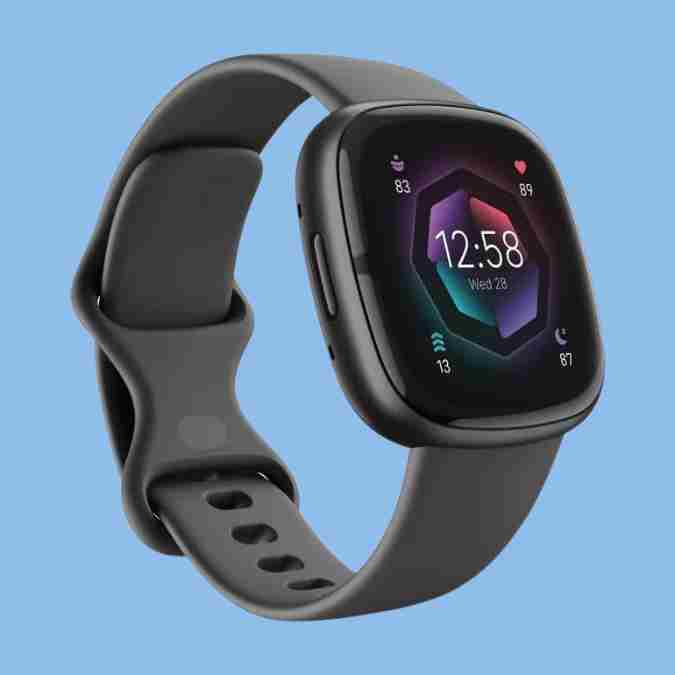
💓 The Tracker That Doesn’t Pretend, But Still Delivers
Not everyone wants (or needs) a $400 gadget to keep tabs on their heart. Maybe you just want something reliable—something that quietly watches over you without making it complicated. That’s what makes the Fitbit Sense 2 such a standout. It doesn’t try to impress you with flashy features. It just focuses on what matters—your heart—and it does that with quiet confidence.
It works whether you’re an Android user or an iPhone fan. And while it won’t brew your coffee or answer calls like the fancier models, it will let you know when your heart’s rhythm isn’t right. And honestly? That’s the kind of feature that counts.
⚙️ Quiet Help When You’re Not Even Thinking About It
If you’ve ever felt your heart flutter or skip and thought, “Was that something?”—this is where the Sense 2 really steps in. With a quick touch of your fingers, it takes a 30-second ECG, guided by easy instructions. Even if you’ve never used heart-monitoring tech before, it won’t overwhelm you.
And the best part? You don’t have to remember to check. It’s always quietly watching in the background with PPG sensors, especially when you’re resting or asleep. If something seems off, the Irregular Heart Rhythm Notification gently taps you on the wrist. No alarms. No panic. Just a soft, timely heads-up that says, “Hey, maybe check in with your heart.”
📊 You’ll Probably Be Surprised by How Good It Is
Let’s be honest—most people don’t expect this much accuracy from a device at this price point. But time and time again, users say the alerts are spot-on, especially when it comes to the things you’d never feel. And because the ECG and notifications are FDA-cleared, it’s not just a fitness feature—it’s a health tool you can genuinely trust.
😴 It’s Watching While You’re Not
One thing people don’t talk about enough? AFib often shows up while you’re asleep. And the Sense 2 knows that. It keeps working while you rest, checking in when you can’t. You wake up, open the app, and you know if your heart stayed steady through the night. That kind of round-the-clock support—without you lifting a finger—is something many of us didn’t know we needed until we had it.
💡 Final Word: No Hype. Just Heart.
So, can the Fitbit Sense 2 detect AFib with accuracy? Yes. Absolutely. It may not have the prestige of the Apple Watch, but it’s not trying to. It’s the kind of device that just shows up, does its job, and helps you stay one step ahead of something that doesn’t always come with symptoms.
If you want a low-cost fitness tracker that quietly looks out for you—without the learning curve or the luxury price tag—this one’s got your back. Literally.
3. Withings ScanWatch 2 | Best for Subtle Style + Clinical Precision | FDA-Cleared ECG & SpO2
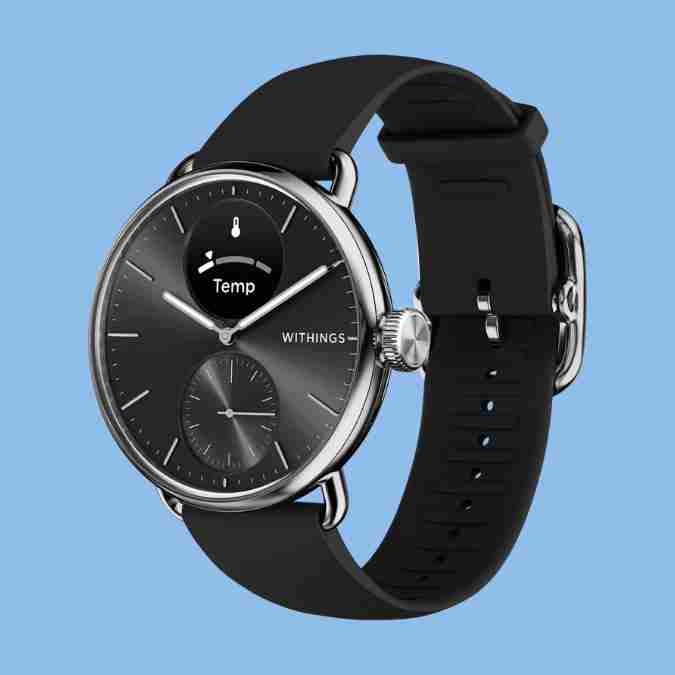
🕰️ A Watch That’s Understated—but Unshakably Smart
At a glance, the Withings ScanWatch 2 doesn’t look like it’s trying to do much. No oversized screen, no glowing icons or flashy rings. In fact, it looks more like something you’d wear to a client meeting than a cardio session.
But that’s exactly the point.
Underneath its minimalist analog design is one of the most reliable and clinically trusted health trackers available today. It doesn’t shout. It doesn’t need to. It just does its job—silently, steadily—while you go about yours.
⚙️ It Knows When Something’s Off—Even Before You Do
If you’ve ever felt your heart race or flutter and weren’t quite sure what to make of it, the ScanWatch 2 has a simple solution. Its FDA-cleared ECG lets you take a quick, 30-second reading from your wrist. No wires, no awkwardness. Just clarity.
But you don’t even have to wait for symptoms. The watch runs passive heart rhythm checks in the background using PPG sensors, especially while you’re still, calm, or asleep. If something doesn’t look right, it doesn’t panic—it simply lets you know with a quiet nudge. No beeps. No stress. Just a subtle heads-up that says, “You might want to check in with yourself.”
📊 The Kind of Accuracy You Can Feel Good About
This isn’t just about fitness goals or trends. The ScanWatch 2 is built with clinical trust in mind. Its ECG and SpO2 monitoring aren’t marketing buzz—they’re FDA-cleared, meaning the data you get is actually worth something. Whether you’re managing a known heart condition or just want peace of mind, this watch doesn’t cut corners.
And it’s not just tech-savvy people who love it—many doctors and cardiologists recommend it for its accuracy in detecting atrial fibrillation, especially in people who wouldn’t have noticed the signs on their own.
😴 It Watches While You Sleep—Without You Noticing
One of the most powerful features? It doesn’t sleep, even when you do. AFib often shows up at night, when your body is quiet and symptoms are least noticeable. The ScanWatch 2 keeps watch through your sleep cycle, silently collecting data on your heart rhythm, breathing, and rest quality. When you wake up, it’s all there—ready for you to review or, if needed, share with your doctor.
No setup. No stress. Just support.
💡 Final Thought: Quiet Confidence, Built In
If you’ve been asking, “Can the Withings ScanWatch 2 detect AFib accurately?”—yes, it can. But it does more than that. It brings together medical-grade health tracking with a design that feels personal, classic, and deeply wearable.
This isn’t for the person who wants their watch to do everything. It’s for the one who wants it to do the right things—and do them well. If you care about heart health but also appreciate quiet design, the ScanWatch 2 may just be the watch you didn’t know you were looking for.
4. Samsung Galaxy Watch 6 | Best Android Smartwatch for Heart Health | ECG, PPG & AFib Alerts
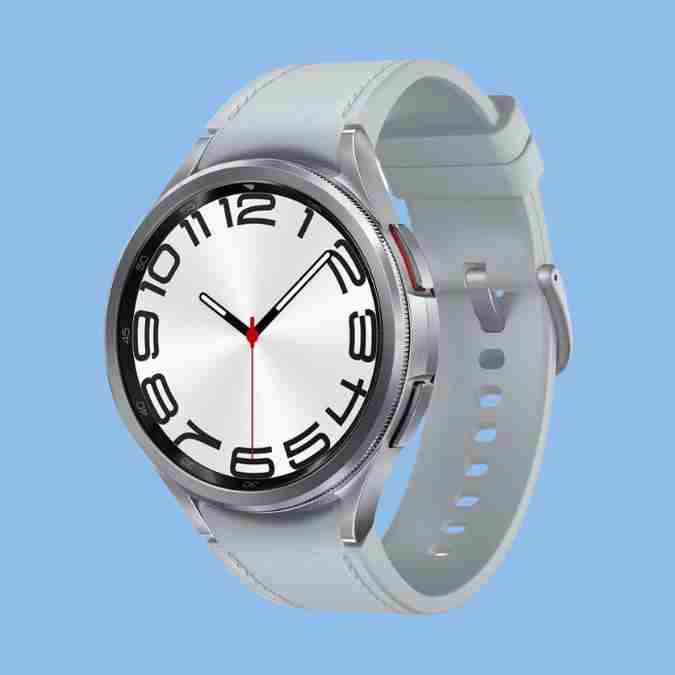
🌐 A Smartwatch That’s Actually Smart About Your Heart
If you’re on Android and want a watch that does more than count steps or flash notifications, the Galaxy Watch 6 is one of the most thoughtful options out there. Yes, it’s sleek. Yes, it keeps up with your messages and calendar. But where it really stands out? It quietly keeps an eye on something most of us rarely think about—our heart rhythm.
It doesn’t scream “medical device,” but make no mistake: this one’s built to notice when something’s off.
⚙️ A Gentle Nudge When Your Heart’s Off Beat
There’s something comforting about having a watch that doesn’t just tell you the time—it tells you when your heart might need a little extra attention. With the Galaxy Watch 6, you can run an on-demand ECG in seconds. Feel a flutter? Hold your finger to the button and let it do the rest. It’ll give you a simple reading to let you know if things are steady—or if it might be time to talk to your doctor.
Even better, you don’t have to wait until something feels wrong. The built-in PPG sensors work quietly in the background, scanning for signs of atrial fibrillation throughout your day. If it spots something unusual, it doesn’t blare alarms—it just gives you a soft heads-up. That subtle support can mean a lot, especially when symptoms are silent.
📊 Reliable Tech You Can Actually Use
Samsung’s been working on this for years, and it shows. While the AFib features aren’t FDA-cleared in every region, users still find the readings helpful and pretty spot-on. It’s not a diagnosis—but it’s often the first sign that tells you to check in.
Pair it with the Samsung Health Monitor app, and everything syncs neatly. You get graphs, summaries, and even the option to share an ECG PDF with your healthcare provider. It turns smart tech into practical insight, which—let’s be honest—is what most of us are really after.
😴 It Doesn’t Sleep on You—Even When You Do
AFib doesn’t wait until morning, and thankfully, neither does the Watch 6. It quietly tracks your heart rate and rhythm while you sleep, along with stress levels and oxygen saturation. You don’t need to configure anything. Just wear it to bed, and by morning, you’ll have a full overnight report waiting for you in the app.
It’s the kind of passive care that makes you feel just a little more at ease, especially if you’ve ever woken up wondering, “Did something happen last night?”
💡 Final Thought: Wellness Wrapped in Design
So, can the Samsung Galaxy Watch 6 detect AFib? Yes—especially when used regularly and with the right setup. It may not carry the clinical badge of some medical-grade devices, but it absolutely earns its place as a daily heart companion.
It blends Android compatibility, clean design, and a calm, intelligent approach to heart health. If you’re someone who wants your tech to do more than buzz and beep—if you want it to actually look after you—this watch has your back… quietly, consistently, and without making a big deal about it.
5. Garmin Venu 3 | Best for Active Lifestyles & Wellness Tracking | HRV Alerts & Rhythm Insights
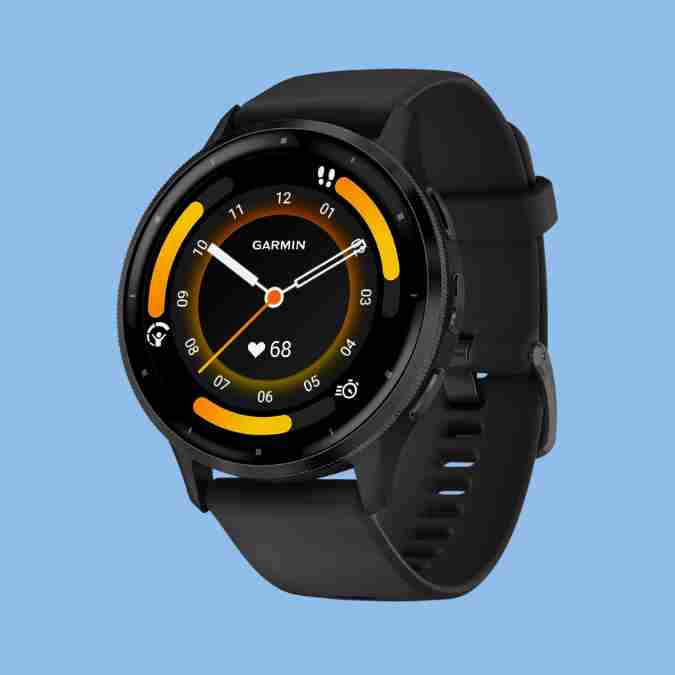
🏃 The Fitness Watch That Feels Like It Knows You
Let’s be real—some of us don’t work out for the selfies or the smart rings. We do it because movement is how we breathe through stress, clear our heads, and feel grounded again. Whether you’re logging 5 a.m. runs, chasing little feet around the living room, or just getting your steps in during a walk-and-talk meeting, the Garmin Venu 3 doesn’t just keep up—it moves with you.
But what makes this watch different is how deeply it cares about what’s happening underneath all that motion. Not just heart rate spikes—but heart patterns. Not just fitness stats—but full-body wellness.
⚙️ It Doesn’t Have ECG—but It Has Something Just as Powerful
No sugar-coating—the Venu 3 won’t give you an instant ECG scan. If you need that specific medical-grade feature, you might need to look elsewhere. But here’s what most people miss: not every heart warning comes with a siren. Sometimes, it’s just a whisper. A shift. A change in rhythm you wouldn’t catch on your own.
And that’s where Garmin steps in. With advanced HRV (Heart Rate Variability) tracking, it can detect subtle signs that your heart might be under stress or dancing to a rhythm that’s… off. No scary alarms. Just a quiet nudge when something feels different—like a trusted friend saying, “Hey, maybe check in with yourself today.”
📊 It Sees Beyond the Numbers—It Sees the Story
Garmin doesn’t just dump data at your feet. It gives you clarity. It blends your heart rhythm, sleep, stress, and recovery into one powerful picture—and suddenly, those mystery fatigue days or unexpected mood dips start making sense.
Inside the Garmin Connect app, you don’t just see numbers—you see you. Over days. Weeks. Months. It’s the difference between guessing and understanding. And if you’ve ever wondered, “Why do I feel this way today?”—this watch might just have the answer.
😴 You Sleep. It Stays Awake.
Some of the most telling heart patterns happen at night—when your body is calm, but your rhythm isn’t. And because AFib can creep in quietly while you sleep, the Venu 3 doesn’t power down with you. It keeps tracking. It monitors oxygen levels, HRV, heart rate, and recovery—all without disturbing your rest.
You won’t feel it. You won’t hear it. But when you wake up, the insight is there—ready to show you how your heart weathered the night.
💡 Final Word: It Won’t Diagnose You—But It Might Wake You Up
So, can Garmin Venu 3 detect AFib? Not in a “press here for a result” kind of way. But can it help you notice patterns that suggest something isn’t quite right? Absolutely.
This isn’t a medical device—it’s a wellness partner. One that jogs with you, stretches with you, listens to your body when you’re too busy to hear it, and quietly connects the dots when something feels off.
If you want a watch that respects your hustle and your heart, one that feels more like a coach than a machine—the Garmin Venu 3 is more than just a smart choice. It’s a heart-smart one.
🧾 Comparison at a Glance: Best AFib Monitoring Fitness Trackers (2025)
| Device | AFib Detection | Type of Monitoring | Works With | FDA-Cleared? | Bonus Features | Price Range |
|---|---|---|---|---|---|---|
| Apple Watch Series 9 | ✅ On-demand ECG + passive notifications | ECG + PPG + IHRN | iPhone only | ✅ Yes | Crash detection, temperature sensor, cycle tracking | $$$ |
| Fitbit Sense 2 | ✅ On-demand ECG + passive notifications | ECG + PPG + IHRN | Android + iOS | ✅ Yes | Sleep-based AFib alerts, stress tracking | $$ |
| Withings ScanWatch 2 | ✅ On-demand ECG + passive alerts | ECG + PPG | Android + iOS | ✅ Yes | Looks like analog, SpO2, respiratory scans | $$ |
| Samsung Galaxy Watch 6 | ✅ ECG + passive alerts (not FDA-cleared in all regions) | ECG + PPG | Android only | ❌ Partially | Blood pressure (in some regions), sleep coaching | $$$ |
| Garmin Venu 3 | 🚫 No ECG, but HRV rhythm insights | HRV + heart rate trends | Android + iOS | ❌ No | Recovery insights, workout analytics, all-day wellness | $$ |
💡 Note: Price ranges are general.
$ = Budget | $$ = Mid-range | $$$ = Premium
🏁 Final Roundup: Which One Is Right for You?
At the end of the day, choosing the best fitness tracker for AFib detection isn’t about specs—it’s about your story. Your lifestyle. Your comfort with tech. And how proactive you want your health tracking to be.
- Go with Apple Watch Series 9 if you’re already deep in the Apple ecosystem and want top-tier, clinically reliable monitoring with extras like crash detection and deep integration.
- Choose Fitbit Sense 2 if you want a budget-friendly option that still gives you FDA-cleared AFib alerts, especially during sleep—without feeling too “techy.”
- Pick Withings ScanWatch 2 if you love classic watch looks but want serious heart-tracking tools hidden inside. It’s stylish, subtle, and seriously smart.
- Opt for Samsung Galaxy Watch 6 if Android is your world and you want a sleek, health-savvy smartwatch that blends heart monitoring with beautiful design.
- Lean toward Garmin Venu 3 if your life is full of movement and you want a fitness watch that watches you, even when you’re not chasing a goal. It won’t diagnose—but it might help you catch the whispers.
💓 Can a Fitness Tracker Really Catch AFib?
Actually—yes. It might sound surprising, but many modern fitness trackers have quietly turned into heart helpers. Devices like the Apple Watch, Fitbit, and Withings aren’t just counting steps anymore—they’re tuned in to what your heart’s trying to say, even when you’re not thinking about it.
How? Two ways:
- ECG gives you a quick check-up when something feels off. Just place your fingers on the watch, and in about 30 seconds, it reads your heart rhythm—similar to what you’d get at a clinic.
- PPG sensors work in the background. They track your pulse while you’re sleeping, walking, or sipping coffee. If your rhythm changes in a way that hints at AFib, your watch gives you a soft little nudge. Nothing dramatic—just a quiet “hey, take a look.”
These alerts aren’t meant to scare you. They’re early whispers from your body—offering a moment to pause and check in before something serious develops.
🤔 Using a More Budget-Friendly Watch?
Cheaper trackers—like some Garmin models—are still great for fitness and general heart rate tracking. They can even show trends in stress or recovery through HRV (Heart Rate Variability).
But here’s the thing: they don’t include ECG or official AFib warnings. So if you’re relying on your watch to catch heart rhythm issues, those budget options may not be enough.
⚠️ Just One More Thing…
These devices are smart—but they’re not your doctor. If your tracker sends you an alert, don’t ignore it. Don’t panic either. Just listen.
If you’ve got risk factors—like high blood pressure, diabetes, or a family history of heart problems—take it seriously. That small tap on your wrist could be your heart’s way of asking for help early.
These trackers aren’t trying to diagnose you. They’re just helping you notice sooner—before things get louder.
🧠 How Do Fitness Trackers Detect AFib?
Your smartwatch may seem like just a step counter—but some are quietly watching over your heart too. They do this using two smart tools: PPG and ECG.
💡 PPG (photoplethysmography) is behind that soft glow under your watch. It uses light to track how your blood pulses with every heartbeat. If your rhythm becomes irregular—too fast, slow, or uneven—PPG notices. And it works 24/7, silently scanning while you sleep, scroll, or relax.
⚡ ECG (electrocardiogram) takes things further. If your heart feels “off,” you can touch the watch for 30 seconds, and it reads your heart’s electrical signals—similar to a clinical test. Many ECG features are even FDA-cleared, making them impressively accurate.
🔄 PPG + ECG Together
Watches like the Fitbit Sense 2 use PPG to monitor passively and ECG for instant checks. If something seems off, it gives you a gentle nudge—no panic, just a friendly heads-up. And sometimes, that whisper could be exactly what helps you catch AFib early.
🧓 Best Fitness Track❤️ Best Fitness Tracker for Seniors With AFib
For seniors, the best fitness tracker isn’t just about smart features—it’s about simplicity, comfort, and peace of mind. Atrial fibrillation (AFib) can be subtle, so having a device that watches quietly in the background—and is easy to use—is a big win. Two standout picks do just that:
✅ Withings ScanWatch
A perfect blend of classic watch style and clinical-level tech, ScanWatch is ideal for seniors who don’t want anything too flashy or complicated.
- FDA-cleared ECG: Just press the crown for a rhythm check.
- 24/7 Passive Monitoring: Quietly checks for AFib while you sleep or relax.
- 30-Day Battery: Forget daily charging.
- Simple Analog Look: Feels like a familiar wristwatch, not a gadget.
It’s great for those who want discreet, reliable heart monitoring without screens and swipes.
✅ Fitbit Sense 2
For seniors who prefer a bright display and easy navigation, the Sense 2 brings modern features without overwhelming.
- Instant ECG: Touch the frame for a 30-second heart reading.
- Background PPG Alerts: Flags irregular rhythms quietly.
- Big, Clear Screen: Easy to read at a glance.
- Caregiver-Friendly App: Data can be shared if needed.
It’s more than a tracker—it’s a gentle health companion.
💡 What to Look For
Seniors benefit most from trackers with:
- Large displays
- Simple AFib checks (or passive detection)
- Long battery life
- Comfortable fit
- User-friendly apps with optional data sharing
Both ScanWatch and Sense 2 strike the balance between ease and accuracy—making heart health more accessible, without the tech overwhelm.
🛒 Where to Buy Affordable AFib Fitness Trackers
- Amazon – Look for deals on cheap wearable AFib watches
- Fitbit.com – Offers discounts and bundle deals
- Best Buy – Try in-store to see size and screen clarity
- Withings.com – Often has bundle sales with BP monitors
📌 Final Thoughts
So, which fitness tracker really looks out for your heart in 2025?
The best ones don’t just count steps—they quietly stand guard. With features like FDA-cleared ECG, around-the-clock rhythm checks, and trusted brands behind them, devices like the Apple Watch, Fitbit Sense 2, and Withings ScanWatch go beyond fitness. They offer quiet reassurance.
Because if something ever feels off…
it’s comforting to know your watch might whisper it before you even notice.
That’s not just smart tech. That’s peace of mind, right on your wrist.
💓 Your Heart, Your Watch, Your Questions
Can a fitness tracker really catch AFib?
It’s hard to believe, but yes—some smartwatches can quietly catch the signs your heart doesn’t shout about. Devices like the Apple Watch Series 9, Fitbit Sense 2, and Withings ScanWatch 2 use trusted sensors like ECG and PPG, and many are FDA-cleared too.
They’re not doctors—but they are listeners. And that gentle buzz on your wrist? It could be your heart’s first whisper for help—before you even feel it.
What’s the difference between ECG and PPG?
ECG is like placing a hand on your chest and saying, “Just checking in.” You start it when something feels off, and in half a minute, it shows you how your heart’s really doing.
PPG is the quiet observer. It watches your pulse with soft light—every moment, no effort needed. While you sleep, stress, or simply go about your day, it’s listening.
Together, they tell your heart’s full story—not just a moment, but a pattern.
What’s the best tracker for seniors with AFib?
For seniors, comfort and calm matter most. No clutter, no noise—just trust.
The Withings ScanWatch 2 is timeless. It looks like a regular watch, but it gently listens beneath the surface. One charge lasts up to 30 days. No flashing screens. No fuss.
The Fitbit Sense 2 is more modern, with a big, bright screen and soft alerts that don’t overwhelm. Its app is easy to navigate, even for those who don’t “do tech.” And yes—loved ones can stay connected too, if needed.
Both are kind to use. And sometimes, that kindness is exactly what the heart needs.




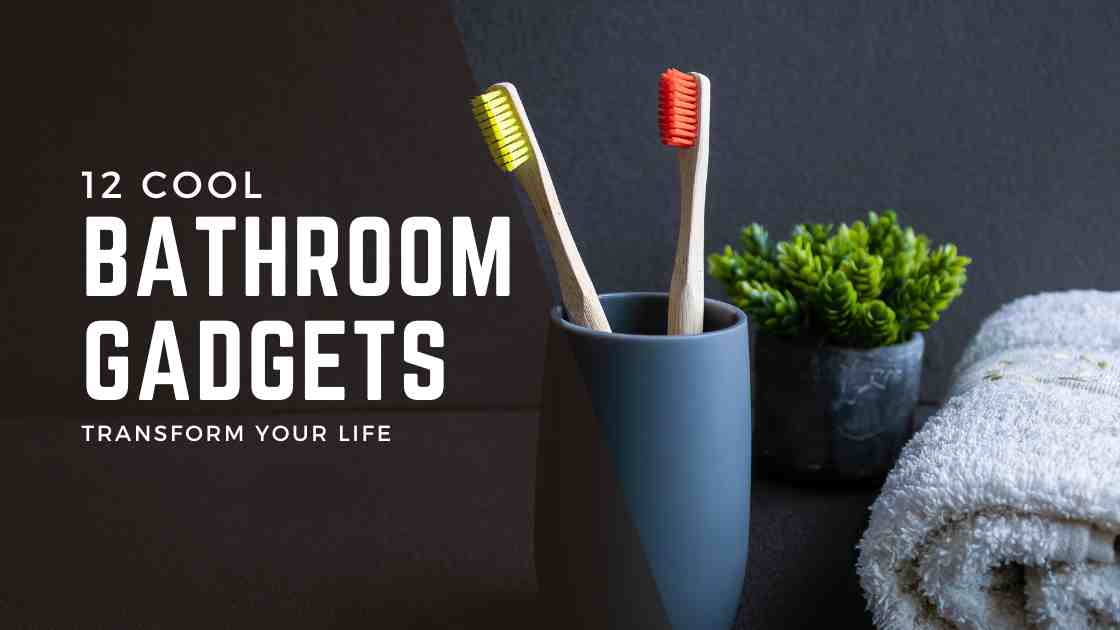
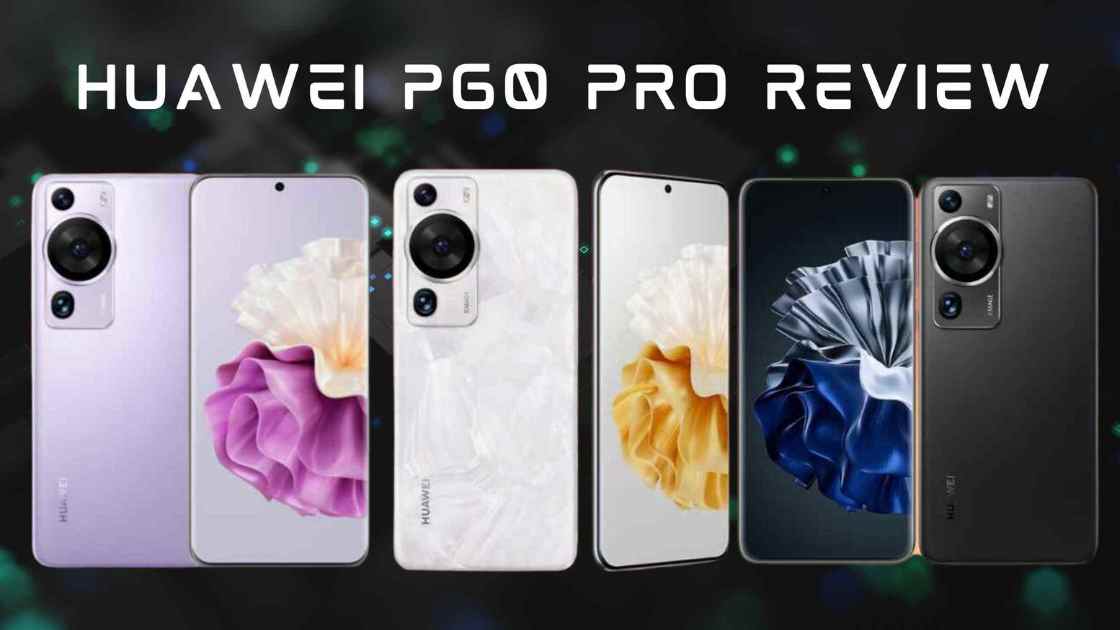
Les Mills Bodycombat VR Review 2025: Best VR Cardio
19 June 2025[…] Which Fitness Tracker Can Detect AFIB Accurately? 2025’s… […]